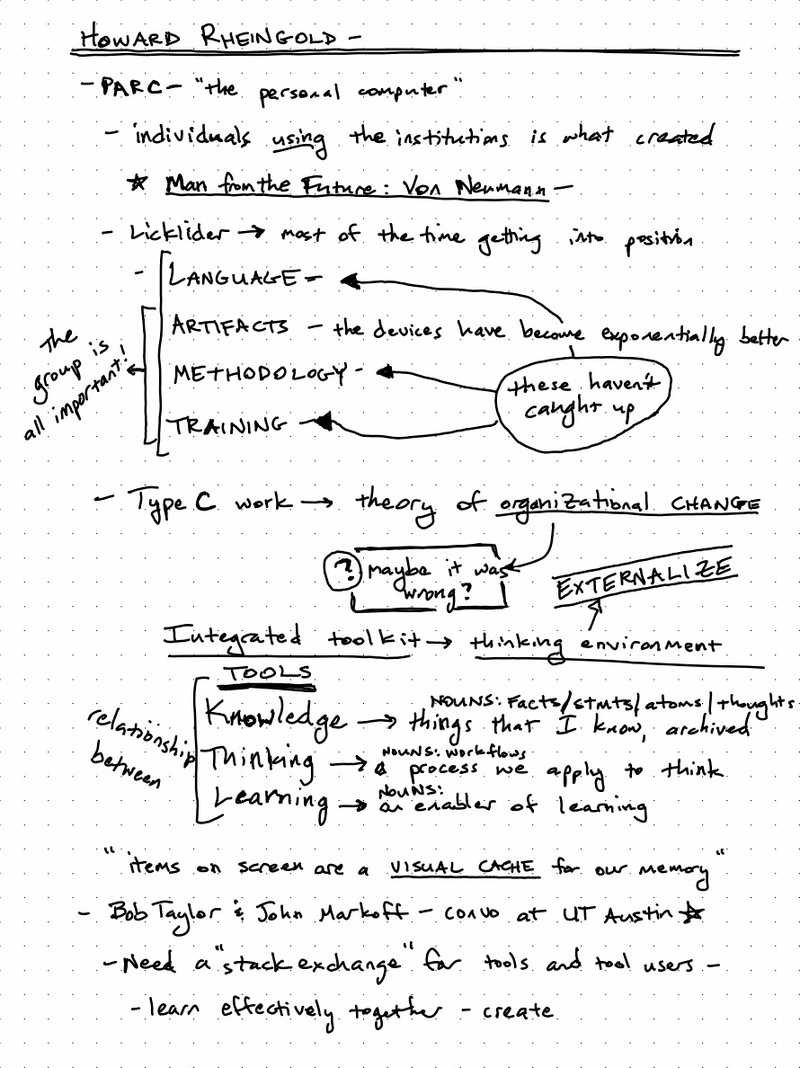Render Recap - August 16, 2022

my notes ( ? )
Another scribe of the Betaworx Render conference on Thinking Tools (context), this time in good old-fashioned blogpost form, with scans of handwritten notes to boot. Contrasting this with some of the other annotations, it's a good example of the difference between "someone else's notes" and "someone else's blog post".
Good intro: when I first got interested in developing new thinking tools, ... One of my main questions was ... where's the scene? ... [the] people doing the work were simply scattered... Enter the Render Conference, stage right."
Session notes
Some takeaways from his session notes:
- a good recap of Readwise's story, who "haven't seen any major innovations since 2020. What's next?", hope there are better funding models out there than bootstrapping, want to get into "the greatest business model of all-time: enterprise SaaS" and have a new app - "a custom web browser (cue the rise of domain-specific browsers!) focused on reading" -more here
- Gordon Brander's slides on Noosphere
- his sketchnotes from Jerry's interview of Howard Rheingold on TFT History (see above) look interesting, particularly
- the way they position Knowledge, Thinking and Learning as three tools which need to be integrated into thinking environments. It makes a pretty good framework for evaluating them, perhaps.
- the call for a "Stack Exchange" for tools and tool users - see my suggestion to the Fellowship of the Link the week before the conference
- his sketchnotes of Alice Albrecht's demo looks very relevant to myhub.ai - the idea of collecting cards for your future self, obviously, has been part of it forever, but reordering and "snapping together" cards on a spatial canvas was something I added ("pinboards") to my PKG chapter earlier this month.
- "the limiting factor is not the AI, but the interface" - from Linus Lee and Alice Albrecht's chat on AI and ML in Building New Thinking Tools
Themes
Even more interesting, his notes from across the sessions:
- interoperability: people are using "a portfolio of tools, working together, to build their workflows. But how to get those tools to talk to one another?" - my sense is that mass adoption will not come from asking everyone to interconnect 5 tools in a unique and interesting way
- that today all we have "are little idea babies. They are young, needy, and unimpressive. They have to be nurtured, protected, and cared-for "
- Interfaces! Thank god that it was "A consistent refrain throughout the day ... the new technologies [shown today] ... don't have well-understood user experience for working with them... particularly [when]... using AI and ML... intermediate interface should sit between the user and the model"
Read the Full Post
The above notes were curated from the full post jessmart.in/articles/render-recap.Related reading
More Stuff I Like
More Stuff tagged conference report , gordon brander , myhub pinboard , 2ndbrain , ai , betaworx , readwise
See also: Digital Transformation , Thinking tools , Innovation Strategy , Science&Technology